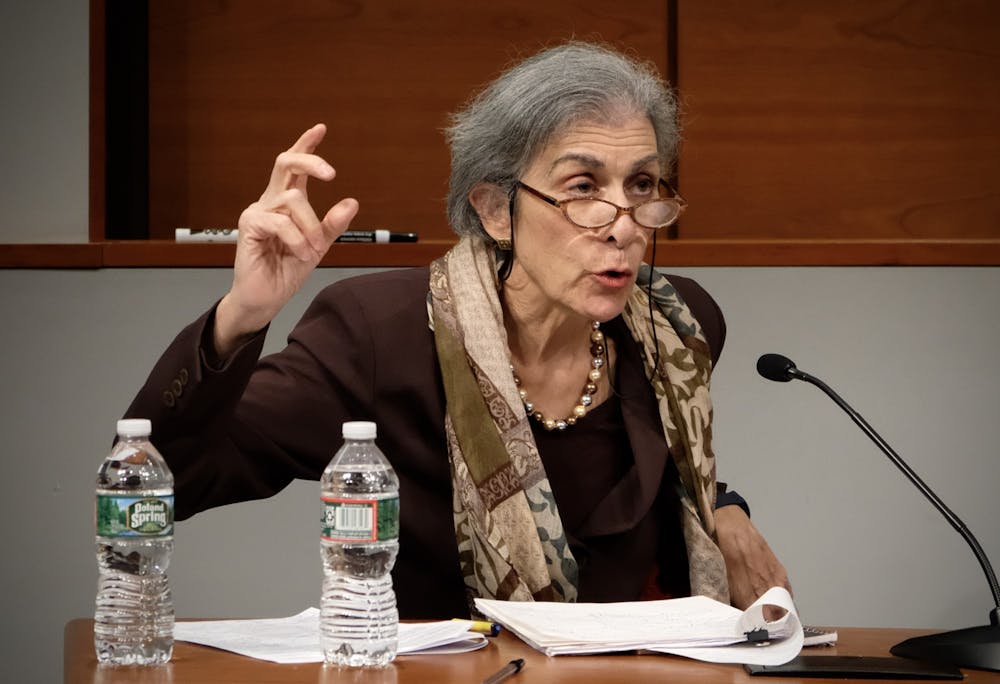Penn Law Professor Amy Wax is no stranger to controversy. Her remark at the National Conservative Conference, where she articulated a claim that America “will be better off with more whites and fewer non-whites,” was denounced by the Daily Pennsylvanian Editorial Board and Dean Ruger of Penn Law as “racist.” Recently, Wax made headlines again after her quote on Justice Ruth Bader Ginsburg stoked student outrage after being included in a Penn Law statement on the justice's death.
Wax has rejected all accusations of bigotry. “Define racist. I have no idea what you mean. It is a bludgeon that is a promiscuous term,” Wax said during a 2019 interview with The New Yorker. On the contrary, she argued that the question of race prevents us from “dealing with real, down-to-earth, concrete problems.” Explaining what these problems are, she continued:
“[T]he question is: Why are successful, peaceful, orderly, prosperous, technologically advanced, democratically sound countries so rare and so few, and why do they clump up in one tiny corner of the globe, namely Europe, the Anglosphere? […] Why do we have a post-Enlightenment portion of the world and a pre-Enlightenment portion of the world? And I guess, to be really crude about it, you would use Trump’s succinct phrase: Why are there so many shithole countries?”
The answer to this question is a vague notion that Wax called “culture.” Citing failure to find the missing Malaysia Airlines Flight 370, Wax asserted that Malaysians lack the West’s “cultural practice of attention to evidence, rigor, analysis, facts.” Her line of reasoning is therefore that proper immigration policy that factors in cultural differences will inevitably prefer white immigrants from Europe, even if its intent is not racist.
To some extent, the label “racist” fails to capture Wax’s bigotry. Her arguments do not discriminate against immigrants based on the genetic superiority of some over others — hence distancing her from the prototypical racists that advocate biological determinism — but rather rely on the alleged cultural differences between the West and the rest of the world.
But Wax’s cultural arguments are based on a simple-minded understanding of cultures, which she presumes to be monolithic entities that develop in isolation from one another. According to this mindset, the West is the West; the rest is the rest. The former is predisposed to evolve and lead; the latter is to forever remain comprised of closed, underdeveloped societies.
These beliefs are helplessly shallow and misled. Admittedly, Wax is not as good an anthropologist as she is a law professor.
Every high school student taking World History knows that the geographical area which Wax designated as “pre-Enlightenment” has seen impressive civilizations to which Western Enlightenment is heavily indebted: It was the Muslim scholars from Baghdad who introduced Hindu-Arabic numerals and the concept of algebra into European mathematics in the 8th century. The Latin translation of the Avicenna’s "Canon of Medicine," an Arabic encyclopedia completed in 1025, set the standard for medical instruction in European universities until the 17th century. And let’s not forget that 19th-century transcendentalists drew inspiration from Vedic Sanskrit literature. Wax wants to turn cultures into sealed-off camps divided along a crude dichotomy. But the history of sharing and exchange defies such reductiveness.
SEE MORE FROM BRUCE SHEN:
Another pitfall in Wax’s reductionist argument is that she understands cultures in terms of ethnic origins, while ignoring the socio-economic dynamic and politico-historical contingencies that have shaped human experiences. Is it more useful to insist on a "Malaysian mind" that is incapable of grasping truths, or to understand that Malaysia’s underdevelopment is a result of successive colonization by the Portuguese, Dutch, British, and Japanese? Is it better to explain Israel’s technological prowess in terms of Israelis being natural innovators, as Wax suggested in the interview, or to know that Israel has received over $350 million in scientific and technological research aid from the United States alone? Wax’s assertions on immigrants’ desirability, which draw legitimacy from the invented differences between groups of people, are decontextualized at best, and dehumanizing at worst.
We can make a fairer comparison if we make up for the disadvantages the powerless communities that Wax unjustly vilified face. Take immigration to America as an example, where immigrants have access to better vocational and educational opportunities than they would at home. Black immigrants, who largely come from Caribbean and African nations (which typically have lower per capita GDPs than the United States), are more likely to be naturalized and speak English than immigrants overall. Most Asian immigrants, likewise, are not from the First World. Yet they earn more than 90% of the average wage of a white native with the same education and experience after 20 years in the United States. There is ample evidence showing that culture of origin is no indicator of assimilation and performance. Perhaps the greatest irony is that Wax's views of immigration lack the commitment to empiricism which she so fervently safeguards for America.
Wax’s bigotry, therefore, roots in her fundamental misunderstanding of cultures; the euphemism “culture distance nationalism” cannot mask the fact that her argument uses stereotypes to discriminate against people of different backgrounds.
But Wax did get one thing right: The University’s open expression policy, which allows her to voice her opinion as well as us to critique and refute her intellectually regressive proposition. Wax’s argument does raise important questions such as what defines a culture and how one represents other cultures. And it is all the more important that the Penn community makes use of free expression and engages in this debate.
BRUCE SHEN is a College first-year student from Shanghai, China studying German Studies. His email address is xshen01@sas.upenn.edu.









